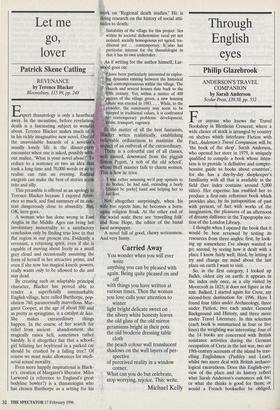Let me go, lover
Patrick Skene Catling
REVENANCE by Terence Blacker Bloomsbury, £15.99, pp. 248 Expert thanatology is only a heartbea away. In the meantime, before revelatio death is a fascinating subject to wond about. Terence Blacker makes much of it in his richly imaginative new novel. One of the unavoidable hazards of a novelist's usually lonely life is the dinner-party encounter when one is asked, possibly with- out malice, 'What is your novel about?' To reduce to a sentence or two an idea that took a long time and 70,000 words or so to realise can ruin an evening. Radical exegesis can make the best of stories seem trite and silly.
This preamble is offered as an apology to Terence Blacker because I enjoyed Rever- ence so much, and find summary of its con- tent dangerously close to absurdity. But, OK, here goes.
A woman who has done wrong in East Anglia in the Middle Ages can bring her involuntary immortality to a satisfactory conclusion only by finding true love in that flat region in our present era. Evidently a revenant, a returning spirit, even if she is capable of moving about freely as a small grey cloud and occasionally assuming the form of herself in her attractive prime, and even if she now has magical kinetic powers, really wants only to be allowed to die and stay dead.
By creating such an adaptable principal character, Blacker has proved able to render a superficially unremarkable English village, here called Burthorpe, pop- ulation 760, paranormally marvellous. Mar- garet Cooper, at the age of about 500 and as pretty as springtime, is a catalyst de hue. She makes extraordinary things happen. In the course of her search for relief from ancient abandonment, she magically raises hell, sometimes rather harshly. Is it altogether fair that a school- girl fellating her boyfriend in a parked car should be crushed by a falling tree? Of course we must make allowances for medi- aeval sexual morality.
Even more happily inspirational is Black- er's creation of Margaret's liberator. Miles Larwood (a reference to England's great bodyline bowler?) is a thanatologist who has chosen Burthorpe as a setting for his work on 'Regional death studies.' He is doing research on the history of social atti- tudes to death:
Suitability of the village for this project lies within its societal dichotomies: rural yet not isolated, socially homogenous yet varied, tra- ditional yet .. . contemporary. It also has particular interest for the thanatologist in that it has its own undertaker.
As if writing for the author himself, Lar- wood goes on: I have been particularly interested in explor- ,ing dynamics existing between the historical and contemporaneous within the village. The .Arhurch and several houses date back to the .15th century. Yet, within a matter of 400 metres of the village green, a new housing estate was erected in 1983. . . . While, to the outsider, the community may seem to be steeped in traditional values, it is confronted • by contemporary problems: development, crime, transport, vagrancy.
In the matter of all the best fantasists, Blacker writes realistically, establishing believable ordinariness to maximise the impact of an outbreak of the extraordinary.
There is a colourful cast of all classes, well named, downward from the piggish Simon Pygott, 'a nob of the old school', whose bluff manner fails to charm women. This is how he tries: was rather assuming we'd pop upstairs to do bodies,' he had said, extending a beefy [should be porky] hand and helping her to her feet.
Not altogether surprisingly, when his wife too rejects him, he becomes a born- again religion freak. At the other end of the social scale there are 'travelling folk' and Rose Hope, the editor of the banal local newspaper.
A novel full of good, chewy seriousness. And very funny.


























































 Previous page
Previous page